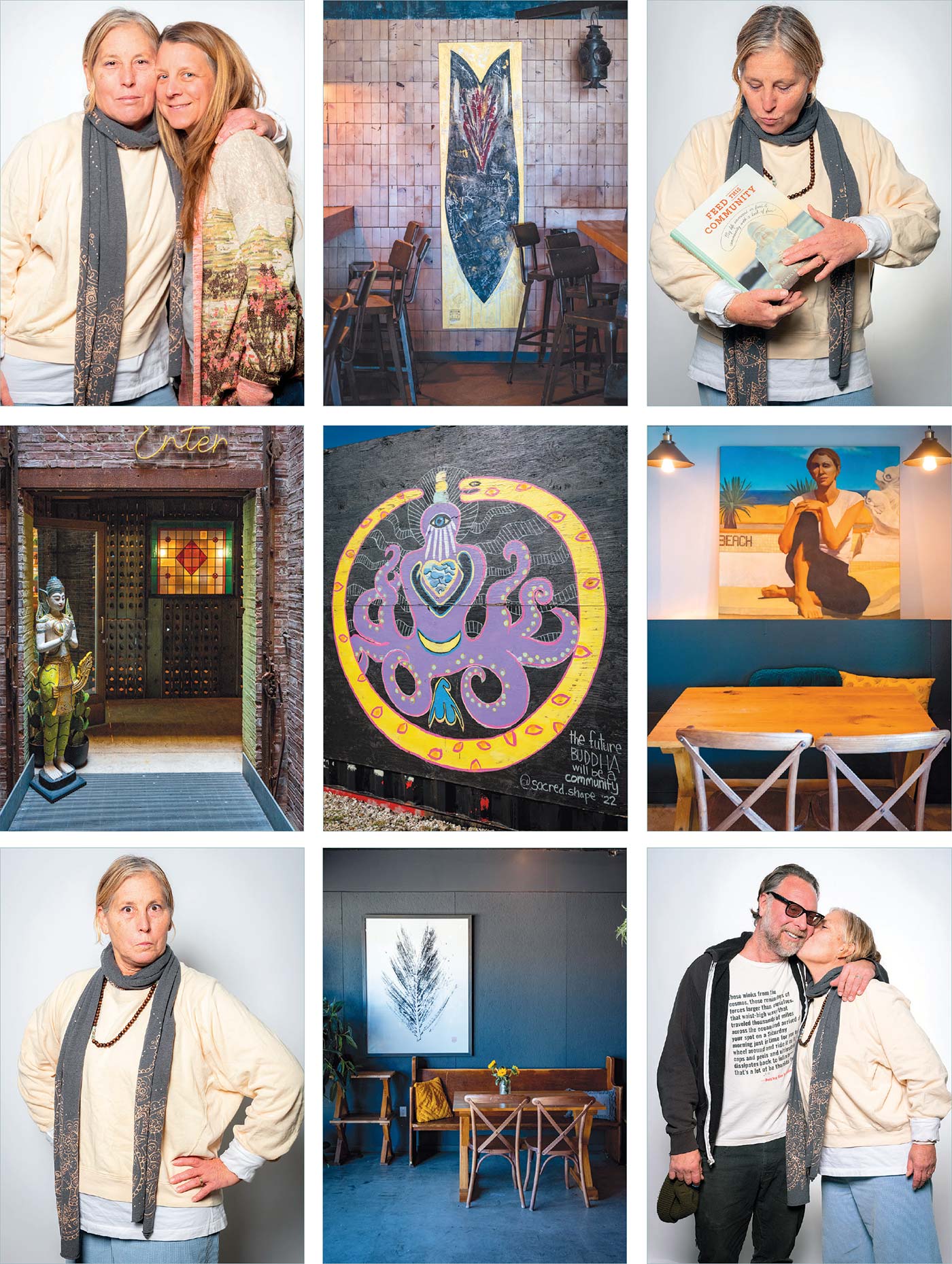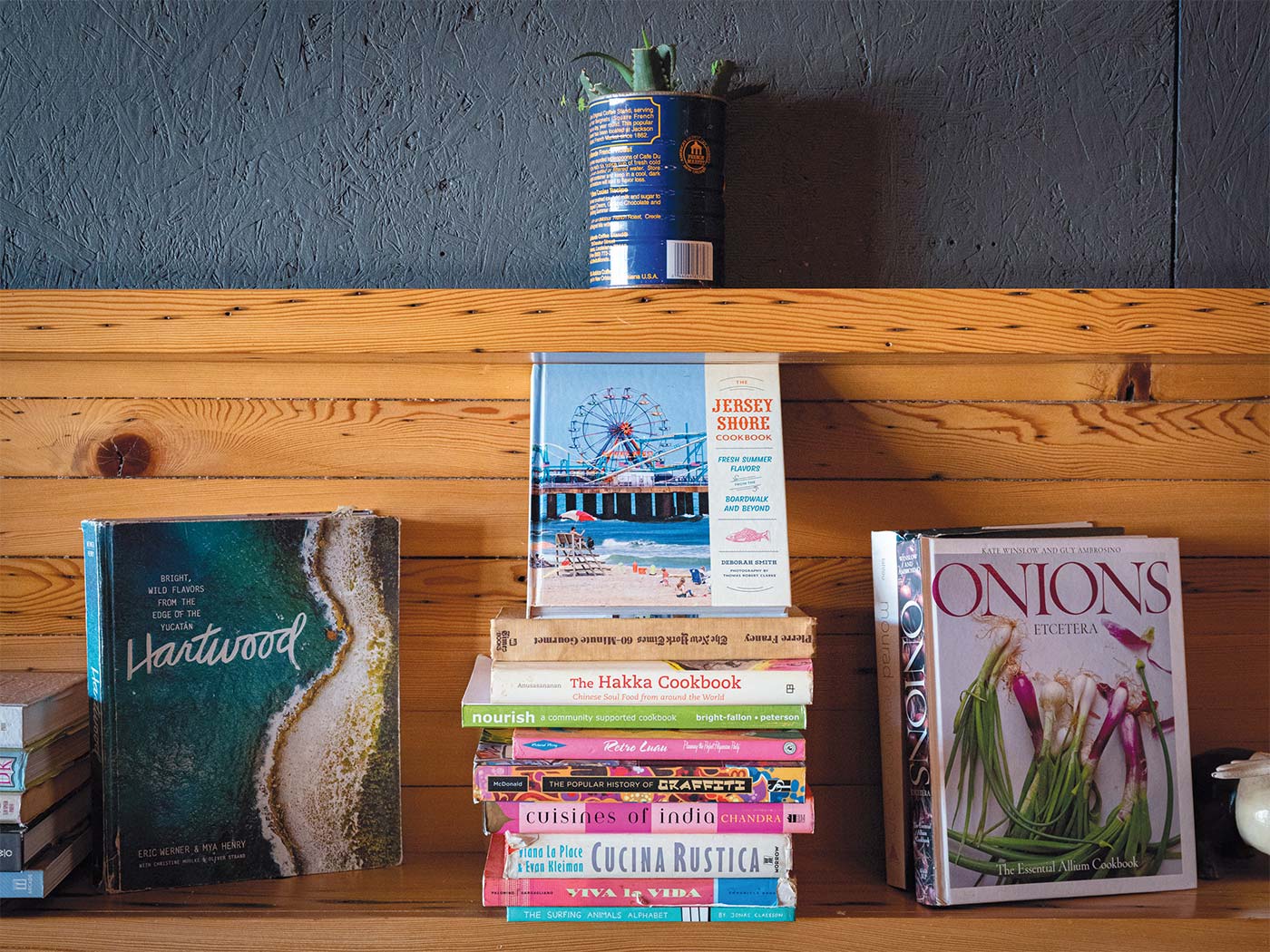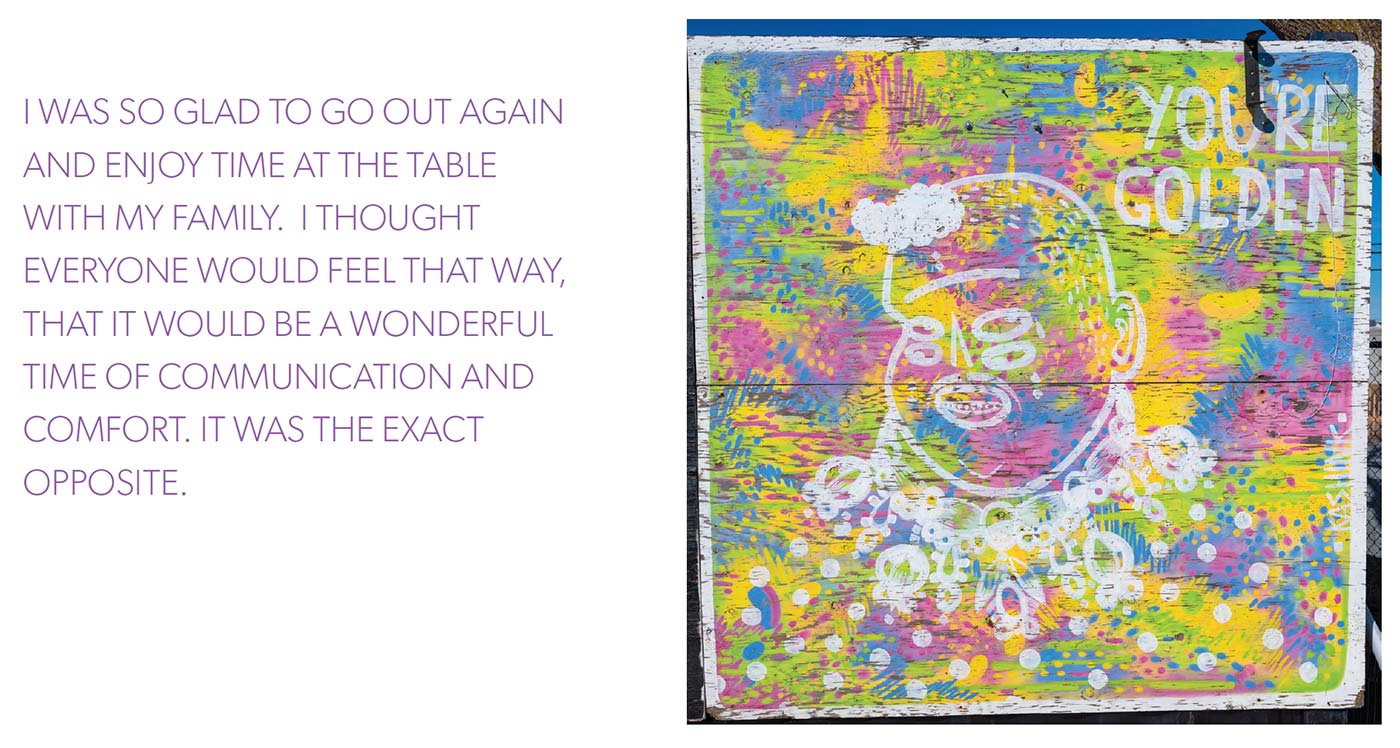Q & A with Marilyn Schlossbach
An Asbury Park dining pioneer downsizes to grow

Top left: Schlossbach (l.) with Summer Deaver, artist, assistant, and “calm keeper”; bottom right: With husband and business partner Scott Szegeski
Photographed at The Whitechapel Projects, Long Branch
Marilyn Schlossbach is one of the pioneers responsible for making Asbury Park the food destination it is today. A face and force behind the renaissance of the town through her restaurants and community service, she is now leaving—or leaving for now. Her story is one that echoes many of the dramatic changes in the hospitality industry the past few years, but also is about personal change.
It’s difficult to imagine now, but when Schlossbach and her husband, Scott Szegeski, opened Langosta Lounge on the Boardwalk in 2008, Asbury Park—and its Boardwalk—was struggling to regain its former glory as a coveted Shore destination. Born and raised In Belmar, Schlossbach comes from a multigenerational Jersey Shore family. Never trained as a chef but self-taught by necessity and cookbooks, her first kitchen stint was as an emergency fill-in, moving from working the floor to working the stove one night at Oshin, an Avon Asian-fusion restaurant owned by her brother.
In Asbury Park, with Langosta as a flagship of sorts, Schlossbach and Szegeski went on to open Pop’s Garage, Asbury Yacht Club, and the Dauphin Grille at the Berkeley Oceanfront Hotel, to name a few. The venues drew a devoted following; the new energy drew commercial and residential development to the city. In 2022, Travel + Leisure referred to Asbury Park as “the coolest place on the Jersey Shore.” In February, Schlossbach announced she was selling her Asbury Park operations.
This conversation took place in January at the Whitechapel Projects in Long Branch, one of Schlossbach’s current collaborations, as final details on the sale of Langosta Lounge and its affiliated businesses on the Asbury Park boardwalk were happening, days ahead of the public announcement. It was unintentionally well-timed in that regard, and Schlossbach was open and intimate, providing insights behind the changes and her views on an industry that has been her home for many years. To be clear, Marilyn Schlossbach is not going away. She is still very much “of the Shore.”
You have been a groundbreaking fixture in Asbury Park.
It was exciting to create a movement in Asbury Park, what we were able to begin and accomplish, through the economic crisis in 2008, through [Hurricane] Sandy, through having kids, through Covid. We overcame some substantial milestone challenges.
Asbury Park has changed. You and a handful of others made it a hip scene, and today maybe it’s even post-hip now that the town is a media darling. Why are you now preparing to “leave the building”?
It has changed and that was bound to happen. There are still a lot of great people doing great things in Asbury Park today. I am just emotionally and physically drained from that project. In 14 years, coming back from Sandy [in 2012] and borrowing over $1 million to basically put it back together, the changes in Asbury, Covid. It’s been a beast. Business is growing again but there is a cap to just how much with the seasonality of that Boardwalk.
I wouldn’t have to leave if there was a lot of growth, financially and emotionally, but there is not. I would rather go somewhere where we can break some of our habits and create something new. To stay in this current routine is not healthy and safe for me.
We know of the obvious impacts of the pandemic on restaurants. Did anything surprise you as we started coming out of the lockdown?
I was so glad to go out again and enjoy time at the table with my family. I thought everyone would feel that way, that it would be a wonderful time of communication and comfort. It was the exact opposite. We tried to ramp up without the critical mass of staffing available and I thought customers would understand. This past summer was the most challenging I have ever had in this business.
Hospitality is about making people feel good. I think we have lost that in business as a whole. I am not a fan of working from home because it has changed how people communicate. I think people got less enjoyment from less interaction with human beings so, when they did get back into it, they didn’t know how to act anymore.


The pandemic has led many to reassess their careers and objectives. It has impacted business owners, too, as in your case. What changed?
For me, the business has become not fun. If you are going to do something in your life and it’s your life’s passion, it’s got to be fun. Well, it can’t be fun all the time but at least laughable, and now I can’t even laugh half the time.
I saw it after Sandy—small business was the hub for people coming together to comfort one another. It’s so much harder for people to feel safe and move to the next day without that connection, and that connection does not seem to have come back fully [after the pandemic].
What does the hospitality industry need to do down the Shore and across the state?
I wish the industry could just take a pause to line up its priorities as a whole. With all the powers that be that can help us—state government, the associations, the major distributors and vendors, the independents—let’s talk about what needs to get accomplished rather than what we think sounds good as an accomplishment. If the industry is going to be taken seriously, we as the industry have to take it seriously, from training and development all the way to how we compensate people.
There is a big fight now for more liquor licenses, but who is fighting for healthcare? I wish everyone would get all riled up about that. It would have a bigger impact than licenses on everyone working in the business. Association healthcare plans could create an affordable system for the industry and help attract and retain more talent.
Where then is the restaurant business heading?
It is going to be transitional because of the financial challenges. The comeback won’t be artistically creative the way I wanted it to be. When we opened Langosta, we were the first weird “out of the norm” type of place. “Vacation cuisine”—what is that?
You’ll see more cookie-cutter food [presentation] with a minimum of hands-on preparation to be more profitable because rents, insurance, and other costs for labor and supplies will stay high. It benefits the large corporate restaurant groups with tighter models and more of a formula, or the smaller flexible places that can more easily contain costs and challenges. A friend in the business once said to me, “Marilyn, you have to start doing restaurants that make you money, not the type you want to eat in.”
Some things that people crave and want will come back eventually. A lot of people in the industry need downtime to get our juices going again.
So then, what about Whitechapel Projects is different? A cultural and communal center for food, drink, arts, and entertainment ... a half mile from the beach. It’s been a while since you were this far from the ocean!
Everything seems interconnected with a lot of people involved. I want to give, to share. My whole career, I have enjoyed collaboration rather than telling everyone how it will be. This model will allow me to do that.
You have had many past and current collaborations. How did Whitechapel come about?
Preston Casertano [Whitechapel founder and partner] was challenged without any real restaurant experience but with a concept that I saw being a fit for myself. I have been in partnerships where I didn’t think my self-worth was important. So, we needed to “date” for a bit (professionally) and know we felt good about each other. We talked and worked together for a while, and I realized he is a really good human being. It took some time, but nothing happens overnight that is worth anything.
We realized we can be an impetus for change in this neighborhood and community. It is still a major undertaking, but it feels like more of a year-round situation for me, not seasonal. We do need followers, though. People will have to seek us out.
A theme of yours throughout this conversation has been safety, comfort, trust. I’ll ask a more personal question: Have you been hurt by the business so much that you feel you need to make this change now?
I come from a lot of trauma in my younger years and never had a big safety circle around me. I’ve moved very quickly to be able to create one. I am also an empathic and emotional human being and want everyone to feel good, not necessarily about me, but in general. It’s hard to think with your brain and not your heart. I tend to think with my heart and underestimate my needs in relationships and businesses, and I got burned a lot.
“Safety” is my word of the year. I need to feel safe with the things I am doing and the people I am doing them with. It is not easy to feel safe when you don’t trust people. It doesn’t feel safe to be vulnerable and I am trying to eliminate that.
You clearly are a lifelong learner and have an enlightened approach to business and to yourself personally. How have you been able to find professional development?
Through the James Beard Foundation. I was accepted last year into the Women’s Entrepreneurial Leadership [WEL] program run by Cornell University professors. Twenty female food industry business owners—we are WEL Cohorts. I’m already seeing how we have developed relationships and are able to communicate with one another as sounding boards.
It had been difficult to find peers early on in my career. I learned from cookbooks. I didn’t go to culinary school or college and wish I had [that type of] experience to interact with a group and grow as a person. This program has been life-changing for me in that regard.
Many of us [in the Cohort] realized we weren’t aligned with our businesses. A lot of people in my life are now aligned with my values. In this program, I realized my growth is going to be to downsize! But to downsize so I can get back to the things that got me into this business [in the first place]. Making food that people enjoy in an atmosphere that makes people smile.
The Whitechapel Projects
15 2nd Avenue, Long Branch
732.963.9218
whitechapelprojects.com
Editor’s Note: In February, BarCo Brands, a NJ-based bar, restaurant, and entertainment group run by Andrea Pappas, Greg Bartz, Phil Villapiano, and Tim McMahon, currently best known for Deal Lake Bar & Co in Loch Arbour, announced it was acquiring Schlossbach’s Langosta Lounge and other Boardwalk properties.
In addition to The Whitechapel Projects, Schlossbach plans to continue her catering operation while also working on business development for other clients and projects, including Two River Gourmet Mushrooms and Ocean Oil.




